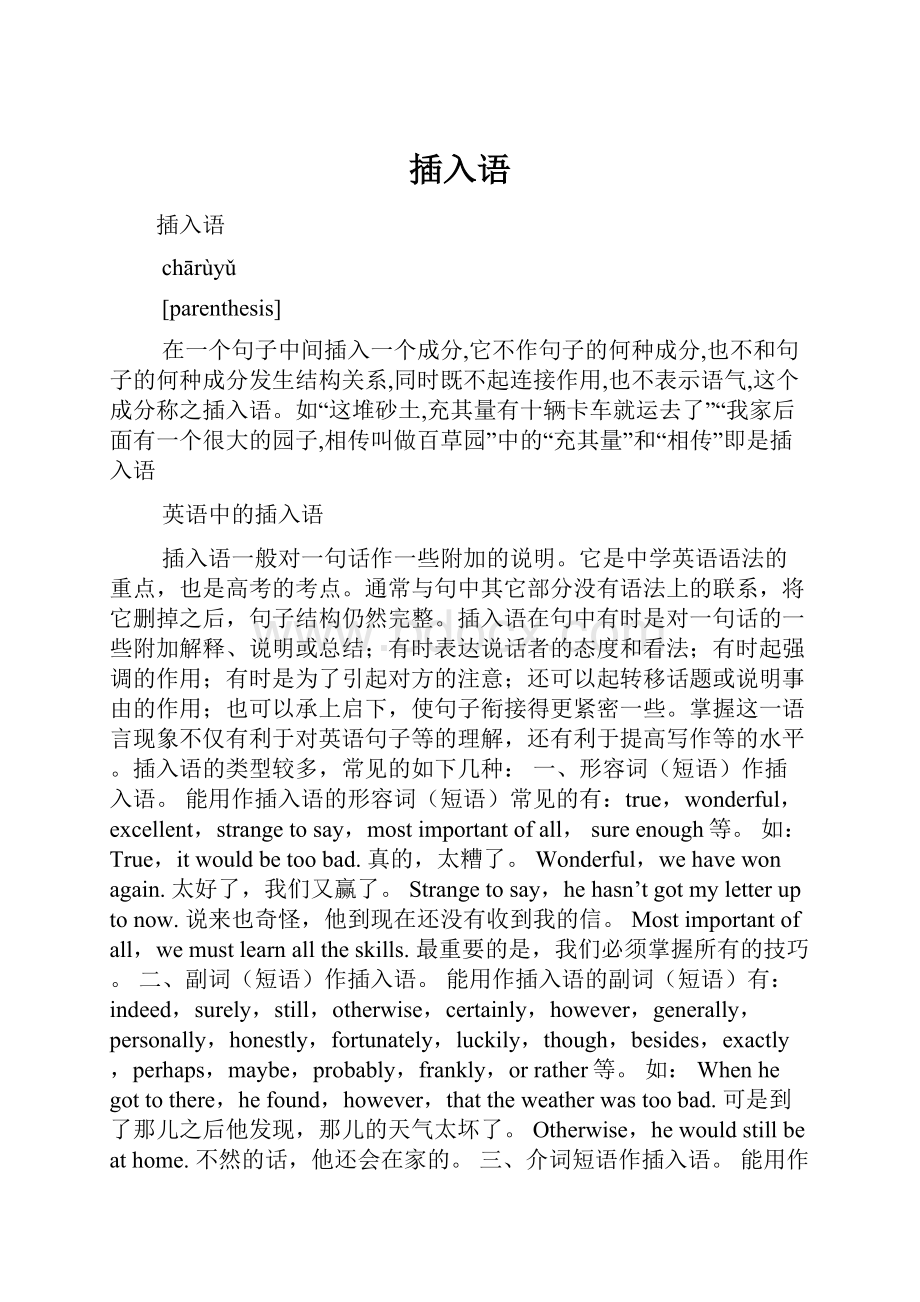插入语.docx
《插入语.docx》由会员分享,可在线阅读,更多相关《插入语.docx(25页珍藏版)》请在冰豆网上搜索。

插入语
插入语
chārùyǔ
[parenthesis]
在一个句子中间插入一个成分,它不作句子的何种成分,也不和句子的何种成分发生结构关系,同时既不起连接作用,也不表示语气,这个成分称之插入语。
如“这堆砂土,充其量有十辆卡车就运去了”“我家后面有一个很大的园子,相传叫做百草园”中的“充其量”和“相传”即是插入语
英语中的插入语
插入语一般对一句话作一些附加的说明。
它是中学英语语法的重点,也是高考的考点。
通常与句中其它部分没有语法上的联系,将它删掉之后,句子结构仍然完整。
插入语在句中有时是对一句话的一些附加解释、说明或总结;有时表达说话者的态度和看法;有时起强调的作用;有时是为了引起对方的注意;还可以起转移话题或说明事由的作用;也可以承上启下,使句子衔接得更紧密一些。
掌握这一语言现象不仅有利于对英语句子等的理解,还有利于提高写作等的水平。
插入语的类型较多,常见的如下几种:
一、形容词(短语)作插入语。
能用作插入语的形容词(短语)常见的有:
true,wonderful,excellent,strangetosay,mostimportantofall,sureenough等。
如:
True,itwouldbetoobad.真的,太糟了。
Wonderful,wehavewonagain.太好了,我们又赢了。
Strangetosay,hehasn’tgotmyletteruptonow.说来也奇怪,他到现在还没有收到我的信。
Mostimportantofall,wemustlearnalltheskills.最重要的是,我们必须掌握所有的技巧。
二、副词(短语)作插入语。
能用作插入语的副词(短语)有:
indeed,surely,still,otherwise,certainly,however,generally,personally,honestly,fortunately,luckily,though,besides,exactly,perhaps,maybe,probably,frankly,orrather等。
如:
Whenhegottothere,hefound,however,thattheweatherwastoobad.可是到了那儿之后他发现,那儿的天气太坏了。
Otherwise,hewouldstillbeathome.不然的话,他还会在家的。
三、介词短语作插入语。
能用作插入语的介词短语有:
infact,inone’sopinion,ingeneral,inaword,inotherwords,inafewwords,ofcourse,bytheway,asaresult,forexample,onthecontrary,ontheotherhand,toone’ssurprise,inshort,asamatteroffact,inconclusion,inbrief等。
如:
Youcan’twaitanymore-inotherwords,youshouldstartatonce.你不能再等了——换言之,你得立即出发。
Onthecontrary,weshouldstrengthenourcorporationwiththem.相反,我们应该加强和他们的合作。
四、V-ing(短语)作插入语。
能用作插入语的V-ing(短语)常见的有:
generallyspeaking,strictlyspeaking,judgingfromby,talkingof,considering等。
如:
Generallyspeaking,theweatherthereisneithertoocoldinwinternortoohotinsummer.一般来说,那儿的气候冬天不太冷,夏天不太热。
Judgingbyhisclothes,hemaybeanartist.从衣着来判断,他可能是个艺术家。
五、不定式短语作插入语。
能用作插入语的不定式短语有:
tobefrank,tobehonest,tobesure,totellyouthetruth,tomakemattersworse,tosumup,tostartwith,tobeginwith等。
如:
Tobefrank,Idon’tquiteagreewithyou.坦率地说,我不太同意你的意见。
Totellyouthetruth,I’mnotsointerestedinthematter.跟你说实话,我对这件事情的兴趣不大。
Tosumup,successresultsfromhardwork.总而言之,成功是艰苦努力的结果。
六、句子(陈述句和一般疑问句)作插入语。
能用作插入语的句子有:
Iamsure,Ibelieve,Ithink,Iknow,Isuppose,Ihope,I’mafraid,yousee,what’smore,thatistosay,asweknow,asIsee,believeitornot等。
如:
Someanimalsonlyhalf-hibernate,thatistosay,theirsleepisnotsuchadeepone.有些动物只是半冬眠,就是说,它们的睡眠并不是深度睡眠。
Ibelieve,Chinawillcatchupwiththedevelopedcountriessoonerorlater.我确信,中国迟早会赶上发达国家。
Hecan’tpasstheexam,becausehedoesn’tstudyhard.What’smore,heisn’tsoclever.他不能通过这次考试,因为他学习不认真,更何况他又不太聪明。
插入语的应用
插入语(句)是说话者对所表达意思的补充、强调、解释或者说话的态度,其位置灵活,常常用逗号或破折号与其他成分隔开,并且在语法上不影响其他成分。
例如:
Ithink,shehasnofeelingforyourtrouble./She,Ithink,hasnofeelingforyourtrouble.我想,她对你的遭遇无动于衷。
一.常见的插入语和插入句。
1.插入语常以副词(副词短语)、形容词(形容词短语)、介词短语、非谓语动词短语等形式出现。
(1)常见的副词及短语:
indeed,surely,however,obviously,frankly,naturally,luckily/happilyforsb.certainly等。
(2)常见的形容词及短语:
funny,needlesstosay(不用说),mostimportantofall等。
(3)常见的介词短语:
bytheway,inafewwords/insum/inshort(简而言之),inotherwords,ingeneral,inone'sopinion/judgment(按照某人的意见),infact,inthefirstplace,ofcourse,toone'sknowledge/surprise/regret/satisfaction/mind/joy/disappointment等。
(4)常见的现在分词短语:
strictly/generally/honestly/personally/exactly/physically/speaking(严格地/一般地/坦诚地等)说;judgingfrom/by…(根据……判断)等。
(5)常见的动词不定式短语:
tobesure(无疑地),tosumup(概括地说),totellthetruth,tobehonest,tobeshort,toconclude,toputitbriefly,toputitinanotherway,tobegin(start)with等。
注意:
上述单词或短语作插入语和状语时的区别。
例如:
(1)Frankly,he'dliketolistentomusic.
(副词作插入语,表示说话人的态度)
Hereyoushouldspeakfrankly.
(副词作状语)
(2)True,yourdaughterisathomenow.(形容词作插入语)
Hecameback,hungryandtired.(形容词作状语)
(3)Judgingfromwhathesaid,hedoeslookdownhiselderbrother.(现在分词作插入语,其主语不是句中的主语,只是说话者的附加说明)
Seeingfromthewindow,hecanseethelake.(现在分词作状语,逻辑主语是句中的主语he)
(4)Totellyouthetruth,hedoesn'tquiteagreewiththisidea.(不定式作插入语,动作主体不是句中的主语,只是说话者的附加说明)
Tobuythemachine,hewenttoBeijing.(不定式作目的状语,逻辑主语是句中的主语he)
2.插入句为简短的、具有完整意义的句子。
常见的插入句如下:
Ithink/hope/guess/know/believe/suppose,Iamsure(我可以肯定地说),thatis(tosay)(也就是说),itseems(看来是),asIseeit(照我看来),what'smore,what'sworse,whatisimportant/serious(重要/严重的是),I'mafraid(恐怕),itissaid(据说),asweallknow(众所周知)等。
插入句独立性强,一般用标点符号将其与其他句子成分隔开。
应当特别注意疑问句的插入句,它一般为倒装语序且无任何标点符号,而且整个疑问句应当保持陈述语序。
例如:
(1)WhatshouldIdofirst?
WhatdoyouthinkIshoulddofirst?
(被插入的疑问句原来为倒装语序,插入后成为陈述语序)
(2)Whoissinging?
Whodoyouthinkissinging?
(被插入的疑问句原来就是陈述语序,不需要做调整)
二.插入语(句)在试题中的应用。
1.单项选择。
由于插入语通常与句中其他成分没有语法上的关系,命题者有意在句中插入一个从句或插入语,造成主谓分离,给考生的理解带来一定的困难和干扰。
例如:
(1)Hemadeanotherwonderfuldiscovery,______ofgreatimportancetoscience.(上海1998)
A.whichIthinkisB.whichIthinkitis
C.whichIthinkitD.Ithinkwhichis
分析:
这是一个非限制性定语从句,which在从句中作主语,代替thediscovery.做这类题目的方法是先将插入语Ithink去掉,然后再将句子还原成为Hemadeanotherwonderfuldiscovery,whichisofgreatimportancetoscience.问题就迎刃而解了。
正确答案:
A.
(2)Infact______isahardjobforthepolicetokeeporderinanimportantfootballmatch.(上海2001)
A.thisB.that
C.thereD.it
分析:
infact在句中实际担当插入语,只不过没用逗号隔开,意思是“实际上,对警察来说在一次重大的足球比赛中,维持秩序是一项困难的工作”。
空格容易把句子当成fact的同位语从句而误选B.正确答案:
D
(3)-Alice,youfeedthebirdstoday,_____?
-ButIfedityesterday.(广东1999)
A.doyouB.willyou
C.didn'tyouD.don'tyou
分析:
这是特设语境,插入语Alice暗示后面句子为带主语的祈使句,正确答案:
B.
(4)Whodoyouthink_______usatalkthisafternoon?
A.togiveB.gave
C.willgiveD.giving
分析:
youthink是一个插入语,将其去掉。
正确答案:
C.
(5)PhilipisaNewYorker,_______,helivesinNewYork.
A.thatisB.besides
C.afterallD.inoneword
分析:
直接选择适合上下文语境的插入语。
正确答案:
A.
2.阅读理解和完形填空。
阅读中出现大量插入语会增加理解障碍。
熟练掌握插入语,有利于分析句子结构,理解文章大意。
例如:
I,ofcourse,likeabicyclebetter.Itdoesn'tcostmemuch,yetitbringsmealotofconvenience.What'smore,itdoesn'tpollutetheair.Bicyclesarereallygoodfriendsofpeople's.
3.写作。
书面表达要求语言连贯、地道,恰当使用插入语,可以给文章增色不少。
例如:
Likemostofmyschoolmates,Ihaveneitherbrothersnorsisters-inotherwords,Iamanonlychild.MyparentslovemedearlyofcourseandwilldoalltheycantomakesurethatIgetagoodeducation.Theydonotwantmetodoanyworkathome;theywantmetodevoteallmytimetomystudiessothatI'llgetgoodmarksinallmysubjects.Wemaybeonefamilyandliveunderthesameroof,butwedonotseemtogetmuchtimetotalktogether.Itlooksasifmyparentsregardmeasavisitororaguest.Dotheyreallyunderstandtheirowndaughter?
Howthingsareinotherhomes,Iwonder.(NMET2001)
1.介词短语用作插入语常作插入语的介词短语有:
infact(事实上),inone’sopinion(在某人看来),ofcourse(当然),aboveall/firstofall(首先),bytheway(顺便)等。
如:
Aboveall,youmustfollowyourteacher’sadvice.Asaresult,wemustwaterthecropfields.Inmyopinion,heisanhonestboy.2.副词用作插入语常作插入语的副词有:
certainly(当然),surely(无疑),indeed(的确),however(然而),fortunately(幸运的是),luckily(幸运的是),probably(大概),personally(就个人来讲)等。
如:
Unfortunately,Iwascaughtintherain.Personally,I’drathergototheoperatheatre.Surely,youmustfinishthetaskbydi3.不定式作插入语常作插入语的不定式有:
tobefrank(坦率地说),totell(you)thetruth(老实说),tobesure(当然)等。
如:
Totellyouthetruth,Ididn’twanttogowithyou.4.V-ing分词短语作插入语常作插入语的V-ing分词短语有:
generallyspeaking(一般来讲),generallyconsidering(一般认为),strictlyspeaking(严格地说),judgingfrom/by(根据……来判断)等。
如:
Judgingfromyouraccent,youmustbefromEngland.Generallyspeaking,thisisaruleforprotectionourschool.5.分句作插入语常作插入语的分句有:
Ithink(我认为),Ihope(我希望),I’maftaid(恐怕),What’smore(而且),What’sworse(更糟的是),Yousee(你清楚)等。
如:
Yousee,theydidn’ttrustme.Hewillcomeontime,Ithink.(注意:
这个句子如把插入语Ithink放在句首,它就成为主句,而后面的句子成为宾语从句成份,即:
Ithink(that)hewillcomeontime.
插入语(句)是说话者对所表达意思的补充、强调、解释或者说话的态度,其位置灵活,常常用逗号或破折号与其他成分隔开,并且在语法上不影响其他成分。
例如:
Ithink,shehasnofeelingforyourtrouble./She,Ithink,hasnofeelingforyourtrouble.我想,她对你的遭遇无动于衷。
一.常见的插入语和插入句。
1.插入语常以副词(副词短语)、形容词(形容词短语)、介词短语、非谓语动词短语等形式出现。
(1)常见的副词及短语:
indeed,surely,however,obviously,frankly,naturally,luckily/happilyforsb.certainly等。
(2)常见的形容词及短语:
funny,needlesstosay(不用说),mostimportantofall等。
(3)常见的介词短语:
bytheway,inafewwords/insum/inshort(简而言之),inotherwords,ingeneral,inone'sopinion/judgment(按照某人的意见),infact,inthefirstplace,ofcourse,toone'sknowledge/surprise/regret/satisfaction/mind/joy/disappointment等。
(4)常见的现在分词短语:
strictly/generally/honestly/personally/exactly/physically/speaking(严格地/一般地/坦诚地等)说;judgingfrom/by…(根据……判断)等。
(5)常见的动词不定式短语:
tobesure(无疑地),tosumup(概括地说),totellthetruth,tobehonest,tobeshort,toconclude,toputitbriefly,toputitinanotherway,tobegin(start)with等。
注意:
上述单词或短语作插入语和状语时的区别。
例如:
(1)Frankly,he'dliketolistentomusic.
(副词作插入语,表示说话人的态度)
Hereyoushouldspeakfrankly.
(副词作状语)
(2)True,yourdaughterisathomenow.(形容词作插入语)
Hecameback,hungryandtired.(形容词作状语)
(3)Judgingfromwhathesaid,hedoeslookdownhiselderbrother.(现在分词作插入语,其主语不是句中的主语,只是说话者的附加说明)
Seeingfromthewindow,hecanseethelake.(现在分词作状语,逻辑主语是句中的主语he)
(4)Totellyouthetruth,hedoesn'tquiteagreewiththisidea.(不定式作插入语,动作主体不是句中的主语,只是说话者的附加说明)
Tobuythemachine,hewenttoBeijing.(不定式作目的状语,逻辑主语是句中的主语he)
2.插入句为简短的、具有完整意义的句子。
常见的插入句如下:
Ithink/hope/guess/know/believe/suppose,Iamsure(我可以肯定地说),thatis(tosay)(也就是说),itseems(看来是),asIseeit(照我看来),what'smore,what'sworse,whatisimportant/serious(重要/严重的是),I'mafraid(恐怕),itissaid(据